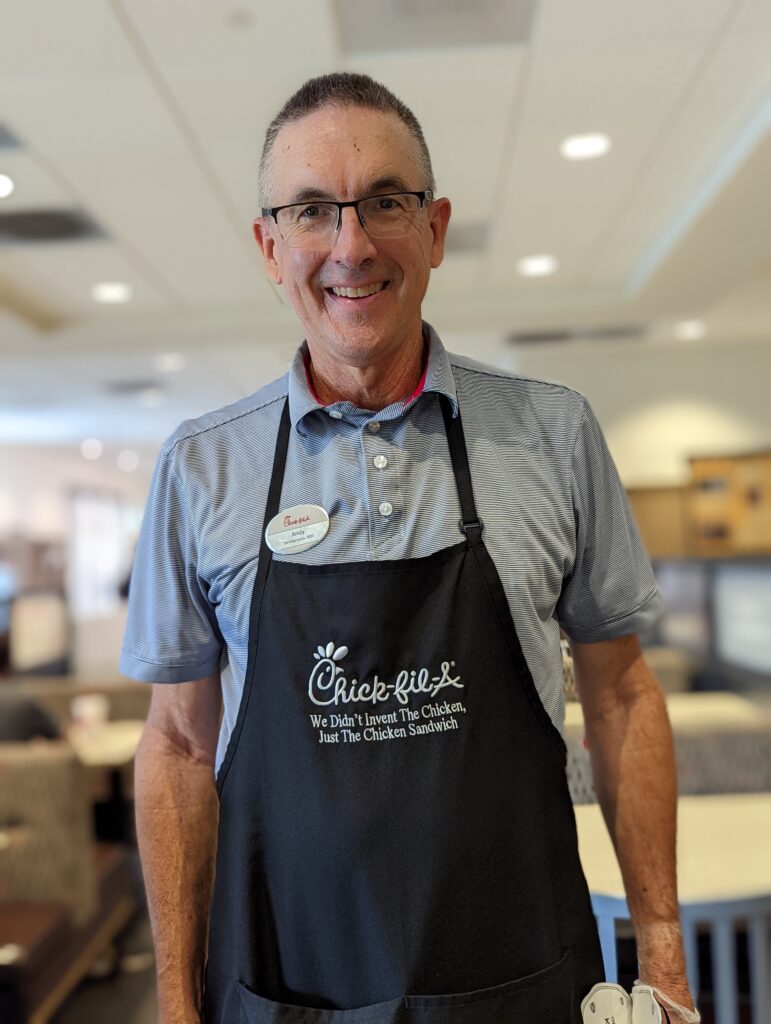A Surprising Turn in My Ministry Journey

As I put on my gray pants, gray and white striped shirt with a distinctive red-and-white chicken logo, black socks, black non-slip shoes, and nametag, my mind began to wander a bit. This was an unexpected and unplanned development in my ministry journey.
Working at a fast-food restaurant—or “quick-service,” as they prefer to call it—was not the usual ministry (or vocational) journey for someone with a PhD in international development and two master’s degrees in theology and education. I was a bit worried that my friends would think I had come upon rough times. But I smiled as I thought about how my education and experiences, as well as my love of serving others, had prepared me well to work in the dining room at a Chick-fil-A restaurant.
Following a Nudge
My youngest daughter had begun to work there and was “blossoming” through the unique Chick-fil-A culture of hospitality and second-mile service. The concept of second-mile service is taken from Matthew 5:41, part of the Sermon on the Mount, where Jesus says, “If someone forces you to one mile, go with them two miles.” The founder of Chick-fil-A, S. Truett Cathy saw the “first mile” as serving guests high-quality meals, which is the basic expectation. He said that everything beyond that—the “second mile”—leaves a lasting impression on guests. As COVID-19 was waning and it was determined to be safe to re-open the dining room, I heard that there was a need for more workers to serve in the dining room. I felt a “nudge” inside of me and applied to work limited hours. I was immediately hired.
Learning the Rhythm of Service
I was thankful that my daughter was working when I arrived for my first shift. She would bring dining room guests their meals, including beverages, on a tray and confirm that their order was accurate. Then she would say, “If you need anything else, my dad will help you.”
A few minutes after my daughter brought the meal to some guests, I came to the table and said, “How is everything?” The guests replied, “Great!” I asked if they needed any more sauces or napkins. They said, “No.” I said, “Enjoy your meal!” They said, “Thank you!” I replied, “My pleasure,” and walked over to the next table and said, “How is everything?”
After checking on each table for the first time, I stopped by a second time and asked, “May I refresh your beverage?” If a guest said yes, I said “Of course.” I asked them to please remove the lid and the straw, then I took their cup and walked quickly to the beverage dispensers behind the front counter to refill it.
Small Gestures, Big Trust
I was very surprised that these small gestures of care quickly build trusting relationships with guests. The fact that many guests were Chinese was a blessing because I have been involved with the Chinese ministry for more than 25 years. Many guests were/are Chinese because this Chick-fil-A is in Monterey Park, CA.
Monterey Park became well-known for being the “first Suburban Chinatown” in the 1960s as it had more than 50% residents of Asian descent. Now Monterey Park is 66% Asian. That means quite a few guests are Chinese. Understanding Chinese culture helps me to build even more trust through small gestures such as offering rèshuǐ (热水, hot water) on cold days (or any day!).
A New Mission Field: The Pickup Counter
When I began serving in the dining room, I noticed men and women coming in the front door to pick up UberEats or DoorDash orders. As a result of Chick-fil-A Monterey Park’s dining room being closed for almost three years during the COVID-19 pandemic, the number of third-party orders through apps such as UberEats increased. It is common for restaurants to put mobile and third-party orders on a shelf for pickup, but during the pandemic, it was determined to not be safe to leave orders on a shelf, so the name on the order was called out when it was ready.
This is a challenge for someone who doesn’t speak English well. The names called out can be unintelligible. I noticed some frustration, so I began to speak to those waiting for pickups in my limited and mostly toneless Chinese. Several began to smile a bit. I began to wait with several of them and listen for the name to be called, then hand the order to them, then hold the door for them as they left. Then several began to teach me some helpful Chinese phrases. I reciprocated by teaching them to say names such as Nancy, George, Jose, Maria, etc. This “language exchange” has built trusted friendships.
A Friendship Built on Laughter and Language
One of my favorite drivers is Yuhong (not his real name). When I first noticed him coming in the door to pick up an order, he was always scowling and didn’t speak. His English was very limited.
Now, as soon as I see Yuhong come in, I walk briskly up to him and say, “nǐ hǎo!” Then, without checking to see if there are any orders waiting, I say “mǎshàng” (literally “on a horse,” Chinese slang for “right away”). He taught me that word, and it always makes him laugh. He replies with “méiyǒu” (“not yet”), and we both chuckle at the familiar exchange.
Then he shows me the name on his UberEats app: Richard. He tries to pronounce it, but the “R” gives him trouble. I pronounce it slowly, he repeats it. We go back and forth a few times until he nails it—“Richard”—with confidence and a big smile.
Right then, a team member calls out, “Order for Richard!” Yuhong beams, walks over to the pickup area and says, “Richard?” I hold the door open for him as he leaves. “Xièxiè,” he says. “Bù kèqì,” I reply. “Huí tóu jiàn.”
From Service to Friendship
Other Chinese-speaking UberEats or DoorDash drivers heard my conversations with Yuhong and started to show me the names on their phone screens. I have recently noticed a large increase in the number of Chinese-speaking drivers who come in. Free English lessons are a draw!
Ministry in the Everyday
Though my Mandarin is still limited and mostly toneless, I’ve learned that effort often speaks louder than fluency. In this unexpected place of ministry, I’ve seen firsthand that trust can be built with one smile, one word, one gesture at a time.
This experience reminds me that God often uses the ordinary to do the extraordinary. Sometimes it begins with a simple “Nǐ hǎo.”
Image credit: Sergio via Adobe Stock

Andy Pearce
Andy serves as Director of Church Partnerships for International Students, Inc. He has ten years experience as a high school math teacher and worked for four years as a textbook sales representative. Andy and his wife, Sandy, have welcomed Chinese scholars to California Institute of Technology for more than 20 …View Full Bio
Are you enjoying a cup of good coffee or fragrant tea while reading the latest ChinaSource post? Consider donating the cost of that “cuppa” to support our content so we can continue to serve you with the latest on Christianity in China.